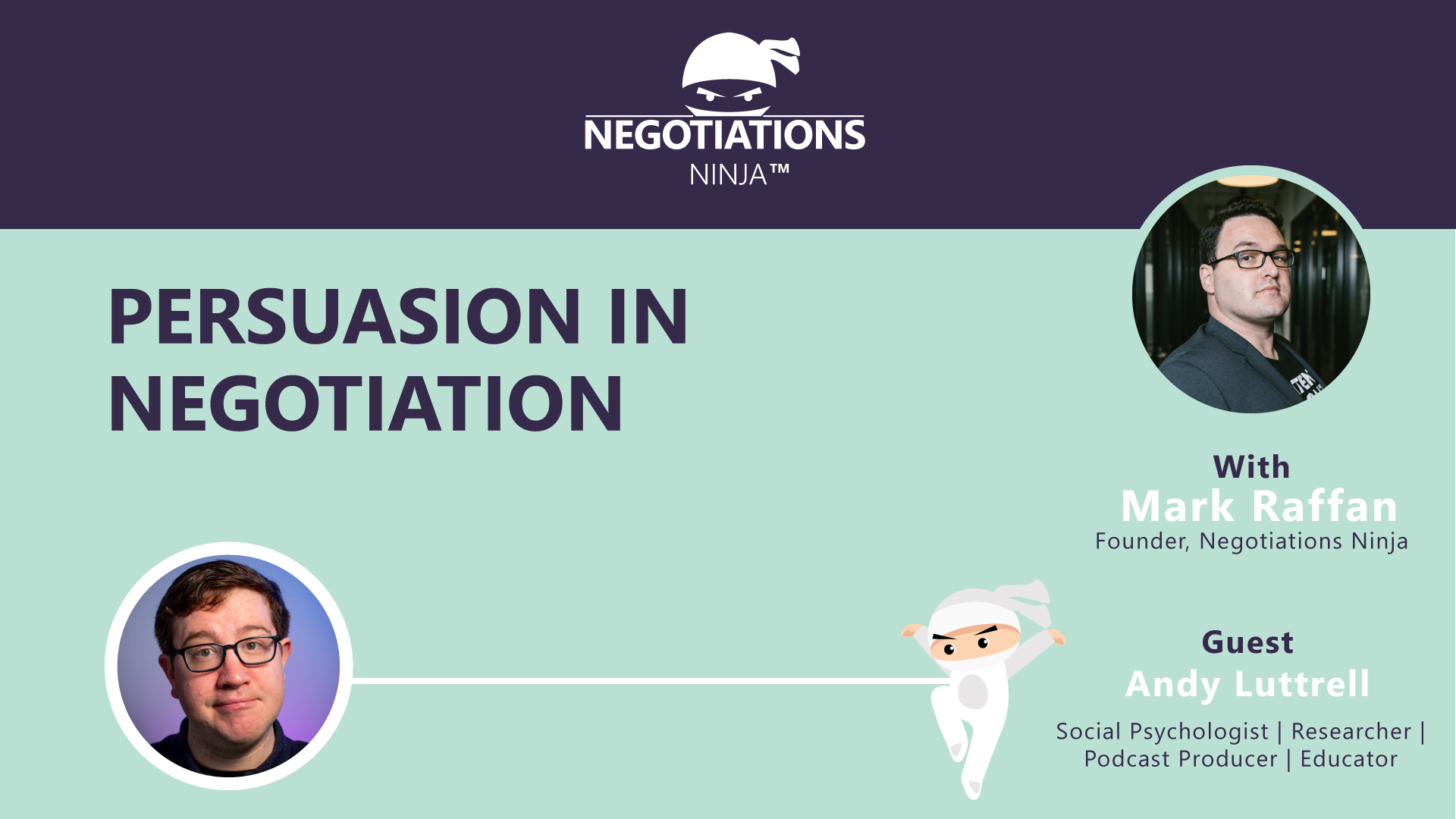Are persuasion tactics effective in negotiation? How do you develop persuasiveness that isn’t overtly obvious? Persuasive rhetoric can be compelling—or it can completely backfire. So how do you effectively persuade someone to consider your side of an argument? Andy Luttrell—a Psychologist in the field of opinion science—joins me in this episode of Negotiations Ninja to dive into persuasion in negotiation.
Outline of This Episode
- [1:53] Learn more about Andy Luttrell
- [2:29] What does persuasion really mean?
- [4:18] How do you use persuasion to drive decisions?
- [6:43] Increase your persuasiveness via credibility and trustworthiness
- [10:52] Why what you say and how you say it matters
- [13:55] Is the use of emotion a powerful tactic in persuasion?
- [21:19] Do people make decisions based on pain, pleasure, or both?
- [24:35] Why cultivating fear is a common persuasion tactic
- [28:31] Is tapping into emotions appropriate in a business setting?
What does persuasion really mean?
So many people think that negotiation is a collaborative process where we build an agreement that makes sense for two or more organizations. But they often forget—or choose to ignore—the impact of persuasion on that conversation.
Persuasion is communication that results in a change in the other person’s attitudes, opinions, beliefs, or behaviors. A version of persuasion can be actively getting someone to change their mind. You can also be employing unintentional persuasion, where your opinion on something influences someone’s decision-making because you have authority in that area.
How do you use persuasion to drive decisions?
You have to consider: Who says what to whom in what context?
- Who: The ‘who’ is the person delivering the message. What is your relationship with the other person? Are you in a place of authority? Do you seem trustworthy?
- What: The ‘what’ is the language you use and the arguments you make. Do you appeal to their moral sensibilities? Do you appeal to their logic and reason? Or do you appeal to emotions or beliefs?
- To whom: The recipient of your message matters. They carry their own biases, opinions, values, and perspectives that shape the way they engage with the message.
- In what context: Is it a casual conversation on a podcast? A note on a postcard you sent in the mail? Or are you on a stage giving a lecture?
Persuasion is a product of all of these things. It’s not done in isolation. You have to understand how all of these things contribute to the conversation.
Increase your persuasiveness via credibility and trustworthiness
Your credibility has to do with your expertise. You have to convey that you know what you’re talking about. You can do that through establishing your credentials, sharing your experience, or even simply being confident and implying that you know what you’re talking about. Everyone leaves a trace of credibility that people can pick up on to either believe what you say—or not.
The other aspect is trustworthiness. If you can convey that you’re honestly delivering your perspective it cuts through assumptions that you’re trying to manipulate them. You also want to appear unbiased and that you’ve considered every side of a topic.
Why what you say and how you say it matters
If you’re trying to get someone to do something, what’s more persuasive? Andy suspects that people think about what would convince themselves and apply it to the counterparty. People generate arguments that are egocentric and reflect the values they hold—even when their audience holds different values.
For example, liberals and conservatives prioritize different values. When one group tries to persuade the other, they lean on their personal values without accounting for the other side’s. This is the wrong tactic.
You can’t just learn the facts and be convinced of the truth. We generate our own reflections on what a speaker is saying. If it doesn’t resonate with the way we see the world, it won’t work as persuasion. You have to think about what will convince the unique person in front of you.
Is the use of emotion useful in persuasion? Do people make decisions based on pain, pleasure, or both? We dissect these questions—and more—in this episode of Negotiations Ninja!
Resources & People Mentioned
Connect with Andy Luttrell
Connect With Mark
- Follow Negotiations Ninja on Twitter: @NegotiationPod
- Connect with Mark on LinkedIn
- Follow Negotiations Ninja on LinkedIn
- Connect on Instagram: @NegotiationPod




